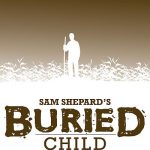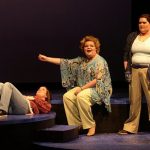Fall Production
Buried Child
by Sam Shepard
directed by Dawn Larsen
October 29-31, 2009
7:30 pm, Fine Arts Theatre
Hyman Fine Arts Center
Francis Marion University
THE STORY:
The setting is a squalid farm home occupied by a family filled with suppressed violence and an unease born of deep-seated unhappiness. The characters are a ranting alcoholic grandfather; a sanctimonious grandmother who goes on drinking bouts with the local minister; and their sons, Tilden, an All-American footballer now a hulking semi-idiot; and Bradley, who has lost one leg to a chain saw. Into their midst comes Vince, a grandson none of them recognizes or remembers, and his girlfriend, Shelly, who cannot comprehend the madness to which she is suddenly introduced. The family harbors a dark secret—years earlier the grandfather, Dodge, had buried an unwanted newborn baby in an undisclosed spot, creating a cloud of guilt which is dispelled only when Tilden unearths the child’s mummified remains and carries it upstairs to his mother. His act purges the family, at last, of its infamy and suggests the perhaps slim possibility of a new beginning under Vince, whose estrangement from the others has spared him the taint of their sin.
THE REVIEWS:
Winner of the 1979 Pulitzer Prize and revised for the 1996 Broadway production, this powerful and brilliant play probes deep into the disintegration of the American Dream.
“Shepard is one of the most prolific of our playwrights, and, for that matter, certainly one of the most brilliant.” — NY Post.
“Mr. Shepard is an uncommon playwright and uncommonly gifted…” — NY Times.
“…wildly poetic, full of stage images and utterances replete with insidious suggestiveness…” — NY Magazine.
Winter Production
Eleemosynary
by Lee Blessing
directed by Keith Best
February 18-20, 2010
7:30 pm, Fine Arts Theatre
Hyman Fine Arts Center
Francis Marion University
THE STORY:
Eleemosynary focuses on the lives of three Wesbrook women: seventy-five-year-old Dorothea; her middle-aged daughter, Artie; and Artie’s sixteen-year-old daughter, Echo. Dorothea, an admitted New Age eccentric, has complicated the lives of the two other Wesbrook women by imposing her thwarted dreams on them, which has alienated Artie not only from Dorothea but from Echo as well. As the play begins, Echo is caring for Dorothea, who has just had a stroke. During the course of the play, Echo tries to bring the three women together. Blessing presents fragmented vignettes of the lives of the three women as they struggle to define themselves both as individuals and as part of a family unit. In this poignant and mature study of familial relationships, Blessing highlights the human need for connection and forgiveness.
THE REVIEWS:
“…a play and a production of a caliber rarely seen on the Philadelphia stage…the language is elegant, witty and carefully wrought.” – Philadelphia City Paper.
“…an engrossing 95-minute entry-alternately funny and poignant…” – Variety. “It is a wonderful job of playwriting.” – Minneapolis Star and Tribune.
“…a funny, perceptive and eloquently written play…” – St. Paul Pioneer Press and Dispatch.
Spring Production
Greater Tuna
by Jaston Williams, Joe Sears, and Ed Howard
directed by Glen Gourley
April 15-17, 2010
7:30 pm, Fine Arts Theatre
Hyman Fine Arts Center
Francis Marion University
THE STORY:
“Greater Tuna” is the hilarious comedy about Texas’ third smallest town, where the Lion’s Club is too liberal and Patsy Cline never dies. Tuna is redneck America, and it’s as clever as it is entertaining.
The play is set in Tuna, a mythical small town in West Texas, where everyone listens to Radio OKKK, all 275 watts of it. Topping the headlines is the winning entry in the American Heritage Essay Contest, entitled: “Human Rights, Why Bother?” Tuna’s residents include a variety of eccentrics, bigots, and oddballs . There’s Aunt Pearl, who poisons the town’s stray dogs; Vera Carp, the richest woman in town and vice president of the Smut Snatchers club, and Didi Snavely, a gun shop owner, who decorates her Christmas tree with hand grenades.
“Howlingly funny…clever…entertaining…kind of a small-scale Peyton Place with a bigoted accent…hilarious…sort of a a SPOON RIVER ANTHOLOGY with a Texas drawl.” — Variety
“…paints a wickedly amusing panorama of conservative mores…it’s a great show.” — Washington Post
“The jokes are…broad, but…quite sharp, too, there is real satire…comedy…enjoyable.” — The New Yorker










